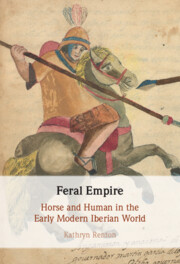
- Coming soon
- Publisher:
- Cambridge University Press
- Expected online publication date:
- May 2024
- Print publication year:
- 2024
- Online ISBN:
- 9781009091015


By tracing the dramatic spread of horses throughout the Americas, Feral Empire explores how horses shaped society and politics during the first century of Spanish conquest and colonization. It defines a culture of the horse in medieval and early modern Spain which, when introduced to the New World, left its imprint in colonial hierarchies and power structures. Horse populations, growing rapidly through intentional and uncontrolled breeding, served as engines of both social exclusion and mobility across the Iberian World. This growth undermined colonial ideals of domestication, purity, and breed in Spain's expanding empire. Drawing on extensive research across Latin America and Spain, Kathryn Renton offers an intimate look at animals and their role in the formation of empires. Iberian colonialism in the Americas cannot be explained without understanding human-equine relationships and the centrality of colonialism to human-equine relationships in the early modern world. This title is part of the Flip it Open Program and may also be available Open Access. Check our website Cambridge Core for details.
‘Kathryn Renton has produced a thorough, richly detailed analysis of the significance of horses and horse-breeding in early modern Spain and its New World colonies. Questioning established narratives and backed by extensive research, she shows how horses were deeply entangled in, challenged, and supported constructions of power within the Iberian Peninsula itself, as well as within Spain’s expanding American empire. Her book writes a new chapter in the political ecology and history of the horse and should encourage similar work on other species and in other parts of the world.’
Peter Mitchell - author of Horse Nations: The Worldwide Impact of the Horse on Indigenous Societies Post-1492
‘In this important contribution to the history of the horse in the premodern world, Renton mobilizes a rich collection of archival and visual sources to describe the pivotal role horses played in Iberian colonialism. Moving between the Old World and the New, she traces the Iberian horse’s centrality to systems of law, identity, and governance, as well as to patterns of environmental change. Her arguments offer new and surprising insights about the conceptual and bodily entanglements that linked settlers, indigenous peoples, and domestic and feral equines in ‘lively assemblages’ of influence and resistance.’
Karen Raber - author of Animal Bodies, Renaissance Culture
‘Based on wide-ranging research into the interactions between horses and humans, Feral Empire offers a persuasive reinterpretation of Spanish colonialism in the Americas. Kathryn Renton is attentive to the varied experiences of both human and equine subgroups, and she shows that they all had political and ecological impacts.’
Harriet Ritvo - author of Noble Cows and Hybrid Zebras and The Animal Estate
‘A lucid, thoughtful examination of more-than-human relations, with a particularly illuminating analysis of indigenous equestrianism in the Americas. It takes local context seriously and insists on a rigorous delineation of a range of human-horse relationships, which does not condemn or romanticize, but rather nuances the trilateral multi-species relationships between people and horses and between varying groups of people over horses.’
Sandra Swart - author of The Lion’s Historian: Africa’s Animal Past
 Loading metrics...
Loading metrics...
* Views captured on Cambridge Core between #date#. This data will be updated every 24 hours.
Usage data cannot currently be displayed.